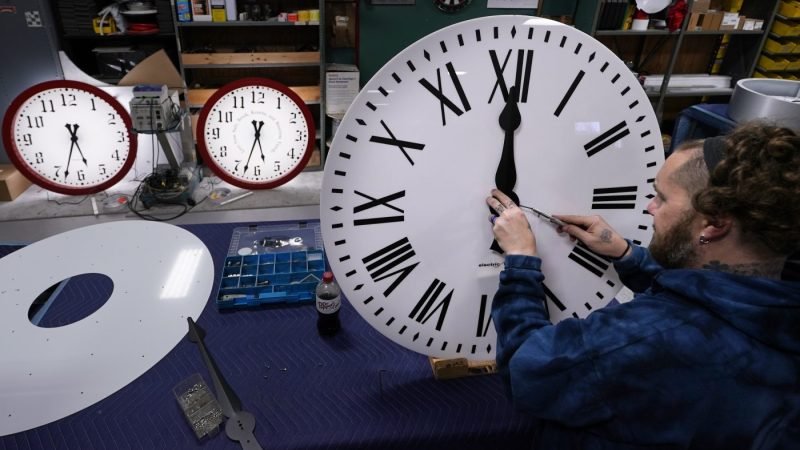
(NEXSTAR) — As the calendar turns to November, so, too, will our clocks turn back to standard time as daylight saving (not savings) time comes to an end. Several states were hoping to avoid the second seasonal time change this year, but only two miss out on gaining an hour of sleep on Sunday.
In all but four states, lawmakers brought forth bills aimed at “locking the clocks.” (Technically, the tally is 14; more on that in a moment.)
There remain bills in Congress that could put the U.S. on permanent daylight saving time or give states more power to observe it themselves. One even earned an aptly-named hearing that Cher may have appreciated, only for a recent effort to fast-track it to be thwarted.
The same can be said for several of the seasonal time change-related bills introduced on the state level over the last year.
Some legislation passed, including a Senate concurrent resolution in California acknowledging the “health benefits of permanent standard time.” Pennsylvania became the latest state to pass legislation calling on Congress to end the biannual changing of the clocks. Similar legislation has seemingly stalled in other states this year.
Two other states, Maine and Texas, passed bills to put their states on permanent daylight saving time, pending federal approval or action. They join eight other states that have done the same.
Those eight states — Alabama, Colorado, Delaware, Florida, Georgia, Louisiana, Tennessee, and Wyoming — as well as Arizona and Hawaii, were among the 14 total states that saw no daylight saving time legislation brought forth during the current legislative session. The other four are New Hampshire, New Mexico, Rhode Island, and Vermont.
At least five dozen pieces of legislation (some were companion pieces introduced in each chamber) regarding the seasonal time change were introduced in states this year.
The map below gives an overview of the type of legislation introduced in each state, and the status of those efforts as of October.
Here’s a further overview of the bills introduced this year.
Alaska
Four bills — two for permanent standard time, two for permanent daylight saving time — were introduced. None has passed.
Arkansas
A bill that would have made standard time permanent died in committee.
California
A bill to make standard time year-round, which would fulfill a duty granted by voters in 2018, remains in committee.
Connecticut
A bill to put Connecticut on permanent daylight saving time, with federal approval, if Massachusetts, Rhode Island, and New York enact such legislation, was referred to committee.
District of Columbia
The District of Columbia’s Board of Elections recently approved the text of a measure that would exempt the district from observing daylight saving time.
Idaho
A bill to put Idaho on permanent standard time, if Washington and Oregon did the same, was introduced earlier this year.
Illinois
Multiple bills in the Senate and House, to enact permanent daylight saving time in Illinois, as well as a resolution urging Congress to make it the law of the land, were introduced this year. They haven’t passed.
Indiana
Three bills, one in the state Senate and two in the House, to exempt Indiana from daylight saving time remain in committee.
Iowa
A bill to make daylight saving time permanent in Iowa was referred to a House subcommittee and recommended for passage. A similar bill in the Senate remains in a subcommittee.
Kansas
A bill to put Kansas on permanent standard time while leaving the door open to switching to permanent daylight saving time following an act from Congress was referred to committee. It passed through the Senate and moved on to the House, but the legislature is adjourned until January 2026.
Kentucky
A bill to make standard time permanent in Kentucky was sent to committee, where it remains.
Maine
The state’s passage of a bill to observe daylight saving time all year, with federal approval, was accompanied by the death of a bill that would have made standard time permanent in the state.
Maryland
A bill to make daylight saving time permanent in Maryland was withdrawn by its sponsor in February, and no additional legislation has been brought forth since.
Massachusetts
Multiple bills to enact permanent standard time, as well as a bill for permanent daylight saving time, have been introduced and referred to committees.
Michigan
A bill to exempt Michigan from observing daylight saving time was referred to committee in March.
Minnesota
While the state approved a plan to enact permanent daylight saving time in 2021, companion bills introduced this year would put Minnesota on permanent standard time until Congress says the state can observe year-round daylight saving time. Both bills are in committee.
Mississippi
Legislation to make daylight saving time permanent in Mississippi was declared dead in March.
Missouri
A bill that would put Missouri on permanent standard time, but switch it to permanent daylight saving time if the U.S. did so, was introduced earlier this year.
Montana
Legislation that would have made standard time permanent in Montana died in May.
Nebraska
Two bills — one for permanent daylight saving time, the other for permanent standard time — were scheduled for final readings in March. Another resolution calling for Nebraska’s Congressional delegation to “take affirmative action to reform the present approach to daylight saving time” was referred to committee.
Nevada
A bill to make standard time permanent in Nevada passed through the Assembly but stalled in a Senate committee. No further action is allowed on the legislation. A similar bill in the Senate faced a similar fate.
New Jersey
A bill to observe standard time year-round in New Jersey was introduced in February and referred to committee, as was legislation for permanent daylight saving time introduced last year.
New York
There have been several daylight saving time-related pieces of legislation introduced in New York this year. They would create a task force to study the effects of daylight saving time on the state, make daylight saving time permanent, or make standard time permanent. None have passed.
North Carolina
A bill to make daylight saving time permanent in North Carolina was introduced in February and referred to committee.
North Dakota
A bill introduced and passed by the House would have made standard time permanent in North Dakota. It was later amended to call for permanent daylight saving time by the Senate before failing to pass. Another bill to make standard time permanent failed to pass the House.
Ohio
House and Senate versions of a resolution calling for Congress to make daylight saving time permanent remain in committee.
Oklahoma
A bill calling for permanent standard time was recommended for passage, but failed to receive enough votes in March.
Oregon
A bill to put all but one county in Oregon, Malheur County, on permanent standard time if California and Washington did the same in the next 10 years remains in committee. If California and Washington opted for year-round daylight saving time, and Congress approved it, all of Oregon, minus Malheur County, would do the same. Malheur County, the only county in the state that is on Mountain Time, would not have been impacted.
A bill with a similar goal, without the permanent daylight saving time stipulation, is also in committee.
Pennsylvania
Bills calling for permanent standard time and permanent daylight saving time were referred to committees.
South Carolina
Bills for permanent standard time and permanent daylight saving time were introduced in South Carolina; both remain in committee.
South Dakota
A bill that would have made standard time permanent in South Dakota failed to pass earlier this year.
Texas
Since legislation to make daylight saving time became law in June, two similar bills are now unlikely to pass. The same is likely true for the multiple bills that would have put Texas on permanent standard time, as well as a joint resolution and a bill that called for year-round daylight saving time.
Joint resolutions (three total) and a bill to give voters the chance to weigh in on which permanent time they would like to observe were also introduced.
Utah
A bill that would have put Utah on year-round standard time was tabled indefinitely.
Virginia
Separate bills to lock the clocks in Virginia — one on standard time, the other on daylight saving — failed to pass earlier this year.
Washington
A bill to make standard time the year-round time in Washington remains in a Senate committee.
West Virginia
Two bills to eliminate daylight saving time in West Virginia were referred to committee.
Wisconsin
Legislation to lock Wisconsin clocks on standard time remains in committee.
States can opt into permanent standard time, though there is a bill in Congress that could allow them to lock their clocks on permanent daylight saving time.
Without federal action or your state opting into year-round standard time, we’ll change our clocks back to daylight saving time on March 8 next year.


